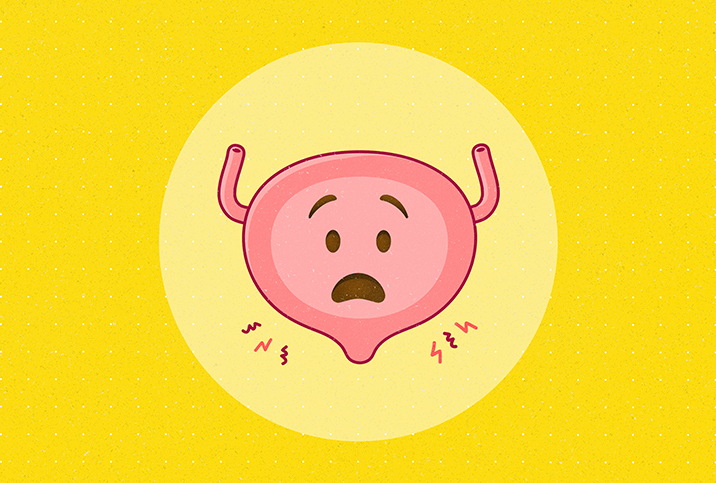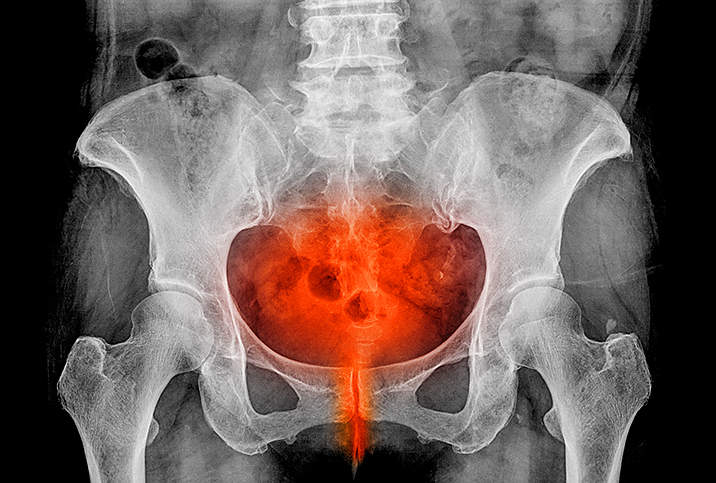Suffering From Recurrent UTIs? This Supplement Might Help

Urinary tract infections (UTIs) can affect anyone, though they're most common in people with a vagina because the urethra is shorter. This anatomical situation means bacteria have less of a journey from outside the body into the bladder, where it begins to wreak havoc.
UTIs are common maladies, affecting up to 60 percent of women over their lifetime. Luckily, they're usually treatable by a short course of antibiotics and drinking lots of water.
However, some people suffer recurrent urinary tract infections (rUTIs), a condition defined as two or more bladder infections in six months, or three or more infections in a year, according to Mayo Clinic.
A history of kidney stones, the decrease of estrogen levels during menopause, anatomical issues with your urinary tract's shape, and genetic risk of developing bladder infections are some of the reasons why you may end up having rUTIs.
The dangers of rUTIs
"Urinary tract infections cause considerable discomfort and pain, which interfere with quality of life. They often cause frequent urination, which can interfere with work, home or social activities. The most worrisome risk of urinary tract infection is that, left untreated, urinary tract infections can result in more severe infections of the kidneys, blood and other organ systems," explained Ryan Stewart, D.O., an Indianapolis-based urogynecologist.
Recurrent urinary tract infections present multiple risks to the overall health of the patient's urinary tract, which includes the urethra, bladder, ureters and kidneys.
If left unaddressed, rUTIs can cause kidney infections and permanent damage to the kidneys, up to and including kidney disease. An untreated rUTI can also cause sepsis, or septicemia, a life-threatening complication of infection that occurs when bacteria enter the bloodstream.
There are additional, albeit rare, potential side effects to rUTIs.
"Persistent urinary pain can lead to global pelvic floor dysfunction, including pelvic floor spasm," said Jocelyn Fitzgerald, M.D., urogynecologist and assistant professor of obstetrics, gynecology and reproductive sciences at the University of Pittsburgh. "This leads to pain with sex and difficulty toileting, including trouble with bladder-emptying and bowel movements."
D-mannose might just help
D-mannose is a type of sugar closely related to glucose. It is unable to be processed by the body, so it is excreted through urine. Having a high volume of D-mannose in your bladder is believed to prevent UTIs.
"It most likely works by attaching to the most common bacteria, E. coli, and preventing the bacteria from sticking to the lining of the urinary tract," Stewart explained.
D-mannose naturally occurs in a variety of produce, such as apples, oranges, mangos, peaches, cranberries and even seaweed. However, the amount of naturally occurring D-mannose found in these foods is likely not enough to help prevent UTIs alone.
Traditionally, rUTIs are treated by long courses of prescription antibiotics. But antibiotics can cause their own problems, including a variety of side effects such as nausea, vomiting, diarrhea and yeast infections. Long-term use can also damage the body's microbiome and cause antibiotic resistance. As a result, doctors have been on the hunt for nonantibiotic options to treat rUTIs, and D-mannose is a potential solution.
What does the science say?
Several small studies on using D-mannose to treat rUTIs have shown promising results. A 2014 clinical trial of 308 women published in the World Journal of Urology indicated D-mannose significantly reduced the risk of recurrent UTIs. Participants taking D-mannose powder also had a significantly lower risk of side effects compared to the group taking antibiotics.
In a 2016 pilot study performed by the Department of Gynaecological Obstetrics and Urologic Sciences of Sapienza University of Rome, patients suffering from an acute UTI were given doses of D-mannose twice a day for three days, then once daily for 10 days, with positive results in alleviating symptoms.
After this initial study, patients were randomly sorted into two groups: one received a prophylactic dose of D-mannose for the next six months and the other received a placebo. At the end of this trial, the results showed only 4.5 percent of those taking D-mannose had a recurrence. Of those taking the placebo, 33.3 percent were diagnosed with another UTI.
"D-mannose is a sugar that seems to reduce the incidence of recurrent urinary tract infections and associated bothersome symptoms. It also leads to a longer duration between episodes of recurrences and consequently improves patient quality of life. D-mannose can be used as a supplementary or alternate treatment for recurrent urinary tract infections," stated the authors of a 2021 systematic review conducted to assess the effectiveness of D-mannose to prevent rUTIs.
Adminstering D-mannose
D-mannose is taken orally, and you can find it over-the-counter in both powder and capsule forms at various health and wellness stores. Most people choose to take capsules because they're easy to swallow, transport and measure the dose. However, if you struggle with swallowing capsules, you may opt to use D-mannose powder, which can be dissolved in water.
In an article reviewed by Alan Carter, Pharm.D., the suggested dosage to treat an active UTI is 1.5 grams twice a day for three days, then 1.5 grams once a day for the next 10 days. To prevent a recurrent UTI, take 1 gram twice a day. Stewart also recommended patients take 1 gram twice per day.
If you're interested in taking D-mannose to treat your urinary tract infection, talk to your healthcare provider about the right dose for you. Many brands of D-mannose sell 500-milligram capsules, so you may have to take several capsules to meet your doctor's suggested dose.
Though most people don't experience side effects from D-mannose, diarrhea and loose stools have been reported. Stewart suggested if you experience diarrhea, try scaling back the dose. Additionally, D-mannose is a sugar, so people with diabetes should speak with their doctors before taking it.
Do doctors recommend D-mannose?
Based on the positive results from studies, doctors recommend D-mannose.
"I recommend it because it has been shown to work with good research and is a nonantibiotic option," Fitzgerald confirmed.
"I recommend D-mannose for patients with recurrent urinary tract infections, especially those involving E. coli," Stewart said. "Research studies suggest that use of D-mannose increases the time from one UTI [to] the next, decreasing the total number of urinary tract infections over time."
If you struggle with recurrent UTIs, consider talking to your healthcare provider about adding D-mannose to your daily regimen.


















